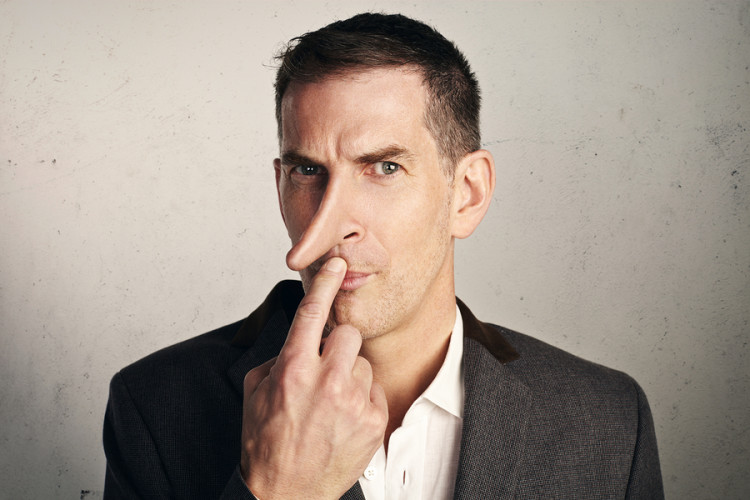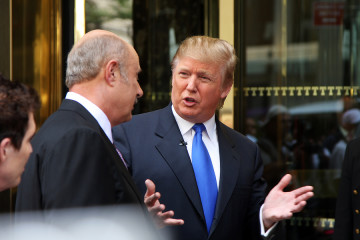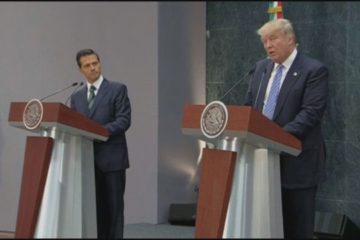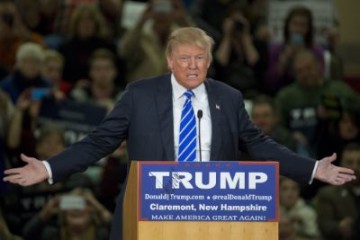Trump’s Promises Don’t Hold Up to Fact-Checking: Albert R. Hunt

©2016 Bloomberg View
O39NP56KLVR7
(Bloomberg View) — A powerful force driving Donald Trump and Bernie Sanders in the presidential race is the frustration of grass-roots voters that politicians in Washington haven’t kept their promises.
QuickTakeHow the U.S. Elects Its Presidents
Democrats, though still high on President Barack Obama, are upset about an economic recovery that benefited Wall Street more than Main Street, top executives more than workers.
The anger is more palpable among Republican voters, who ushered in big congressional majorities for the party, expecting to end Obamacare, reduce the size of government, cut taxes and bolster national security. None of it happened.
With that track record of broken promises and with Trump emerging as the likely Republican presidential nominee, it’s good to look at his prominent promises and the critiques:
* National Security: Trump has pledged to be tough, to defeat the Islamic State by bombing oil fields, which he would then turn over to U.S. oil companies. He would force Arabs to do the fighting against the Islamic State. He says he would “get along very well” with the Russian strongman Vladimir Putin, whom he has praised as a strong leader. He gets his foreign policy advice from watching television news programs, he says. This doesn’t impress many foreign policy experts. “He has said very little of substance,” says former Senator Richard Lugar, an Indiana Republican who was chairman of the Foreign Relations Committee. “It appears he doesn’t have a real grasp of the range of complex issues or hasn’t done his homework.” Adds Leon Panetta, who served as defense secretary and Central Intelligence Agency director in the Obama administration: “It’s the sort of stuff you expect to hear at the bar at the country club.”
* Mass Deportations: Trump proposes removing 11 million undocumented immigrants within two years. He poses the challenge in simple terms: “They say you have to go through a huge legal process. You don’t. They are illegal.” The American Action Forum, a right-of-center research organization run by Douglas Holtz-Eakin, a prominent Republican economist, will soon release a study on the economic impact of Trump’s plan: The number of personnel devoted to apprehensions would soar to 90,582 from 4,844; the number of attorneys and courts would increase twentyfold; the number of detention beds would have to increase tenfold and almost 100,000 chartered buses and flights would be required. American Action estimates that the cost to the economy would be $1 trillion. The non-partisan Pew Research Center calculates that the deportations would cause big job losses in sectors of the economy: 26 percent of farming, fishing and forestry workers; 17 percent of building maintenance and cleaning personnel, 14 percent of construction workers. The liberal Center for American Progress says studies show that many of these jobs would go unfilled, devastating the economy.
* The Border Wall. Trump vows to build a wall along the Mexican border that would cost about $8 billion and that would be paid for by Mexico. Experts ridicule that possibility. “The Mexicans treat this with total disdain,” says Alex Nowrasteh of the libertarian Cato Institute. “I don’t know any policy people that take this seriously.”
* Trade: Trump would impose tariffs on some goods from Mexico and huge penalties on imports from China, from 25 percent to 45 percent. These countries are cheating America on trade, he charges. But trade specialists note that he couldn’t do this unilaterally. “No president in our lifetime has ever contemplated anything like this, but I believe Congress would have to act,” says Susan Schwab, who was U.S. trade representative under President George W. Bush. Moreover, she says this would be in violation of international trade rules and Mexico and China would respond by going to the World Trade Organization, where they would win a judgment. Or they could retaliate against U.S. goods, such as agricultural products, which would “inflict great damage.”
* Taxes: Trump proposes a huge across-the-board tax cut that he says would make the U.S. more competitive, take 75 million people off the tax rolls and create more equity. It would pay for itself by eliminating some deductions and credits. Expert analysis shows that it would indeed take tens of millions off the tax rolls. But little else holds up. Both the left-of- center Tax Policy Center and the right-of-center Tax Foundation agree that the Trump plan doesn’t come close to paying for itself, and would cost more than $9 trillion in revenue over the first decade. Both concur that it’s heavily skewed in favor of the wealthiest taxpayers. Even Trump’s promise to crack down on hedge-fund and private- equity executives who benefit from a lower tax rate on capital gains, instead of the top ordinary income rate on carried interest, doesn’t hold up. Many of these arrangements are partnerships and Trump’s plan also calls for the top corporate rate to drop to 15 percent, a little lower than the top capital gains rate.
To date, Trump has been immune from substantive criticism, and he may have answers to these complaints, though he has been questioned passively. His Republican rivals began to grill him on issues such as health care; that should be just the start.
This column does not necessarily reflect the opinion of the editorial board or Bloomberg LP and its owners.
To contact the author of this story: Albert R. Hunt at ahunt1@bloomberg.net To contact the editor responsible for this story: Max Berley at mberley@bloomberg.net
For more columns from Bloomberg View, visit http://www.bloomberg.com/view







No Comment